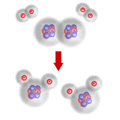|
One of the skills required to tackle chemistry questions is the ability to understand descriptions of experiments and to construct equations from these descriptions. The basic experimental terminology is essential in order to follow any procedure. For example, there are several synonyms used for the term "to produce" such as "to give", "to form" etc. This section seeks to make the wording of questions more transparent. |

|
Terminology
The following is a list of useful terms and their explanations. It is important to differentiate between that which is reacting and that which is produced in a process. Study the words carefully before carying out the exercise. Clues to equation state symbols may also be given by words such as 'precipitate' or 'dissolved'.
- Burning - reacting with oxygen (or air) producing oxides.
- Combustion - a reaction with oxygen (or air) releasing energy.
- Crystallise - to deposit crystals from a solution
- Decompose - to break apart a compound into simpler substances.
- Dissolve - mix a solute (solid) into a solvent (liquid) until it disappears.
- Distill - heat and lead the vapours produced into another container
- Decant - pour liquid off carefully leaving any solid behind in the vessel
- Deposit - to come out of solution, usually as crystals, or the products laid down in the electrodes in electrolysis.
- Effervescence - gas evolution (to effervesce = to bubble and release a gas)
- Electrolyse - pass an electric current through an ionic solution causing reactions to occur at the electrodes.
- Filter - pass a liquid mixture through a filter paper to remove any undissolved solids
- Precipitate - a solid formed by the addition of two solutions, the ions of which combine to produce an insoluble solid
- Reflux - heat using apparatus designed to condense and collect any vapours produced and lead them back in the reaction vessel.
- Titrate - to add one solution to another until a specific end point is reached (When the reaction is complete)

